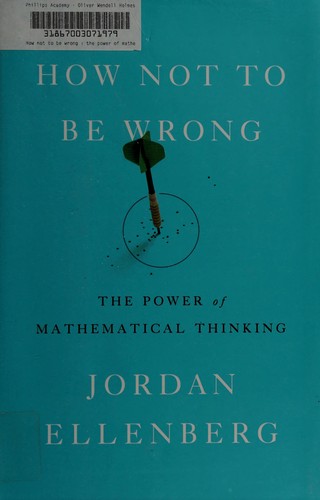Description from Google Books:
A brilliant tour of mathematical thought and a guide to becoming a better thinker, How Not to Be Wrong shows that math is not just a long list of rules to be learned and carried out by rote. Math touches everything we do; It's what makes the world make sense. Using the mathematician's methods and hard-won insights-minus the jargon-professor and popular columnist Jordan Ellenberg guides general readers through his ideas with rigor and lively irreverence, infusing everything from election results to baseball to the existence of God and the psychology of slime molds with a heightened sense of clarity and wonder. Armed with the tools of mathematics, we can see the hidden structures beneath the messy and chaotic surface of our daily lives. How Not to Be Wrong shows us how--Publisher's description.
Snippet from Google Books:
Armed with the tools of mathematics, we can see the hidden structures beneath the messy and chaotic surface of our daily lives. How Not to Be Wrong shows us how--Publisher's description.
Description from Harvard Library:
"In How Not to Be Wrong, Jordan Ellenberg shows us that math isn't confined to abstract incidents that never occur in real life, but rather touches everything we do--the whole world is shot through with it. Math allows us to see the hidden structures underneath the messy and chaotic surface of our world. It's a science of not being wrong, hammered out by centuries of hard work and argument. Armed with the tools of mathematics, we can see through to the true meaning of information we take for granted: How early should you get to the airport? What does "public opinion" really represent? Why do tall parents have shorter children? Who really won Florida in 2000? And how likely are you, really, to develop cancer? How Not to Be Wrong presents the surprising revelations behind all of these questions and many more, using the mathematician's method of analyzing life and exposing the hard-won insights of the academic community to the layman--minus the jargon. Ellenberg pulls from history as well as from the latest theoretical developments to provide those not trained in math with the knowledge they need. "--

